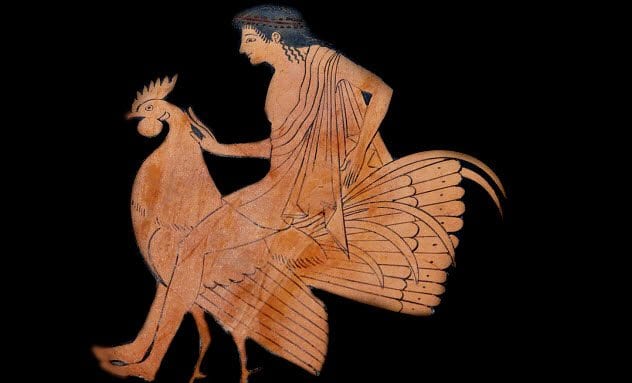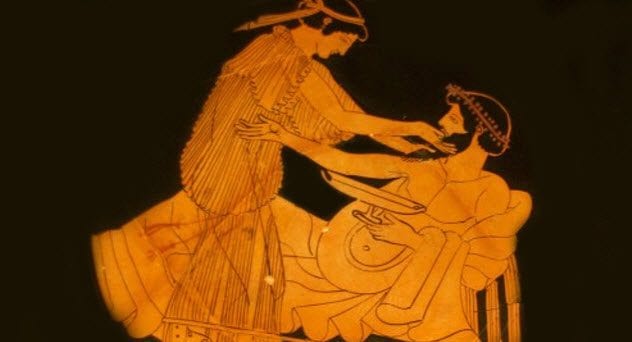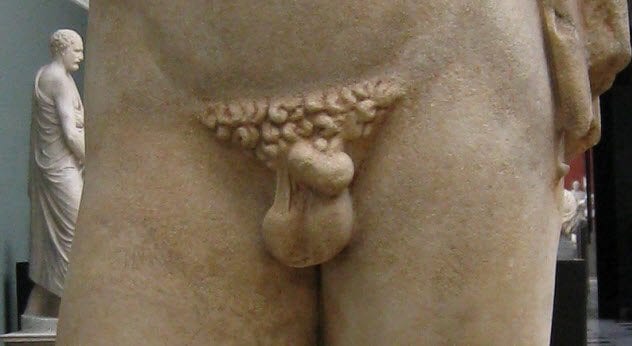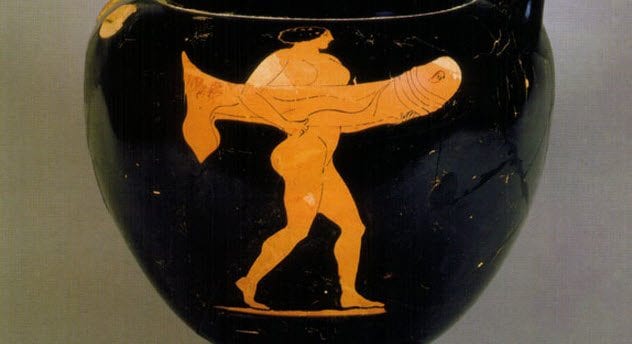 History
History  History
History  Weird Stuff
Weird Stuff 10 Wacky Conspiracy Theories You Will Need to Sit Down For
 Movies and TV
Movies and TV 10 Weird Ways That TV Shows Were Censored
 Our World
Our World 10 Places with Geological Features That Shouldn’t Exist
 Crime
Crime 10 Dark Details of the “Bodies in the Barrels” Murders
 Animals
Animals The Animal Kingdom’s 10 Greatest Dance Moves
 Movies and TV
Movies and TV 10 Box Office Bombs That We Should Have Predicted in 2025
 History
History 10 Extreme Laws That Tried to Engineer Society
 History
History 10 “Modern” Problems with Surprising Historical Analogs
 Health
Health 10 Everyday Activities That Secretly Alter Consciousness
 History
History 10 Dirty Government Secrets Revealed by Declassified Files
 Weird Stuff
Weird Stuff 10 Wacky Conspiracy Theories You Will Need to Sit Down For
 Movies and TV
Movies and TV 10 Weird Ways That TV Shows Were Censored
Who's Behind Listverse?

Jamie Frater
Head Editor
Jamie founded Listverse due to an insatiable desire to share fascinating, obscure, and bizarre facts. He has been a guest speaker on numerous national radio and television stations and is a five time published author.
More About Us Our World
Our World 10 Places with Geological Features That Shouldn’t Exist
 Crime
Crime 10 Dark Details of the “Bodies in the Barrels” Murders
 Animals
Animals The Animal Kingdom’s 10 Greatest Dance Moves
 Movies and TV
Movies and TV 10 Box Office Bombs That We Should Have Predicted in 2025
 History
History 10 Extreme Laws That Tried to Engineer Society
 History
History 10 “Modern” Problems with Surprising Historical Analogs
 Health
Health 10 Everyday Activities That Secretly Alter Consciousness
10 Truly Disgusting Facts About Ancient Greek Life
The Greeks were philosophers. They were the fathers of democracy, men of a more civilized time who lived lives of meaning in the pursuit of truth.
On paper, anyway. Everyday life, though, was less glamorous than the few shining moments that made their way into history. Real life in ancient Greece was difficult, dirty, and often truly disgusting.
10 Your Doctor Would Taste Your Earwax

When you visited a doctor in ancient Greece, you could pretty much count on him reaching into your ear and taking a little nibble of your earwax. That was how your doctor got a diagnosis: He’d taste your bodily fluids.
Of course, doctors had more diagnostic tricks than just tasting people’s earwax. The doctor would choose the test depending on the symptoms. For example, a doctor might run his fingers through your phlegm or lick your vomit to see how sweet it was.
All this started with Hippocrates—the man behind the Hippocratic oath. He believed that the body was a collection of fluids and that each bodily fluid had a specific taste. Greek doctors were taught what those bodily fluids should taste like so they could know if something was wrong.
According to Hippocratic medicine, urine was supposed to taste like fig juice. So if you felt a little under the weather, your doctor would take a little sip—and if your urine wasn’t tart enough, he knew there was a problem.
9 People Wiped Themselves With Stones

Toilet paper didn’t make its way to Europe until the 16th century. Before then, people had to find their own ways to clean up. Like the Romans, the Greeks would sometimes clean themselves with a sponge attached to a stick—but not every Greek was so lucky.
More often, the Greeks would clean themselves with stones. They kept a pile of pebbles at their lavatories and grated hard stone against their bodies to clean up. Apparently, these were hard to come by. The Greeks had a saying to encourage a little frugality in the bathroom: “Three stones are enough to wipe.”
Other times, they’d take broken shards of ceramic pots and scrape themselves clean with that. Particularly vengeful Greeks might etch their enemies’ names onto a piece of pottery, shatter it, and use it to wipe their own butts.
It might not be a coincidence that hemorrhoids were a major problem in ancient Greece.
8 Older Men Would Trade Roosters For Sex With Boys

Greek men would take young boys as lovers. The older man would always take the initiative. Usually, he’d present himself before a young, prepubescent boy and offer him a live rooster—a surefire way to win anyone’s affections that still works today.
The elder partner would act like a father to his new lover boy, teaching him the ways of the world. In a way, that might almost seem like a justification—but it’s not like these men were sleeping with young boys out of a sense of civic duty. The men wouldn’t pick the boys who most needed instruction. They’d pick the best-looking ones they could find.
The boy would be the older man’s constant companion—until the boy started to grow facial hair. Once a boy could grow hair on his face, the older man viewed the boy as getting on in years and booted him out.
When he grew a beard, the boy became a man. Now it was his turn to pick a boy of his own and keep the whole twisted tradition going.
7 Athletes Sold Their Sweat

Before competing, Greek athletes would take off all their clothes and cover themselves in oil. That was how they performed. Whether they were running or grappling with another man, Greek athletes would do it naked.
By the end, they would usually be covered in filth. So afterward, the athletes scraped all that sweat, filth, and dead skin off their bodies. It would be gross to watch—but a lot worse if your job was to help out.
A group of slaves working as gloios-collectors would have to do just that. They would run around collecting all the scrapings and bottling up all the weird, disgusting things that fell off the athletes’ bodies.
These scrapings would then be sold as medicine. People would rub the sweat of athletes on their skin. They believed that it calmed aches and pains—which it probably didn’t do particularly well.
If nothing else, though, the Greek people, after rubbing sweat and dirt on their skin, got to smell like an Olympian.
6 Women’s Illnesses Were Treated In The Filthiest Ways Possible

The Greeks believed that women had a unique susceptibility to the impure. Disgusting things, they believed, affected women in a way that they did not affect men.
That didn’t just mean that women were more easily grossed out—this was an idea that became part of their medicine. When a woman had a disease, the Greeks believed that there was no better treatment than disgusting filth.
A woman suffering from a discharge, for example, would drink a mix of “roast mule excrement” and wine. If she had a miscarriage, they’d put cow dung on her. This occurred because of another weird belief: that a woman’s womb could move around the body. They believed that the womb would be so disgusted by the smell of the dung that it would run away.
5 Sneezing Was Promoted As An Effective Birth Control Method

The Greek physician Soranus taught that birth control was a woman’s responsibility. If a woman got pregnant, he felt, it was her own fault. After all, it was a little unreasonable to expect men to do anything to stop that from happening.
In reality, if a Greek woman got pregnant, it probably was a man’s fault—specifically, Soranus’s. He told women that they could just sneeze instead of using contraceptives. After making love, Soranus told women that they just needed to squat, sneeze, and rinse and they wouldn’t get pregnant.
Obviously, it didn’t work. Soranus had a few backup ideas, though. He also suggested rubbing honey or cedar resin on your genitals before making love—which, if nothing else, probably discouraged people from having sex in the first place.
4 Slaves Had To Wear Chastity Belts

The Greeks didn’t want their slaves to waste their time making love under the stars. If you were a slave in ancient Greece, there was a decent chance your owner would make you wear a chastity belt just to make sure.
Greek slaves would often have to endure something called infibulation. That meant that a metal ring would be wrapped around their genitals. It would seal them shut tightly enough that even getting excited would be painful, and it could only be taken off with a key.
If your master made you wear a chastity belt, you knew it could have been a lot worse. This was really just an alternative to becoming a eunuch.
3 They Thought Lesbians Had Giant Clitorises

When it came to women’s rights, ancient Greece wasn’t exactly the most progressive country. They didn’t really believe in listening to what women had to say—and so the ancient Greeks had some pretty weird ideas.
Above all, the Greeks really didn’t understand lesbians. They couldn’t conceive of any two people making love without somebody penetrating somebody else. They refused to believe that women were doing anything else.
And so, they concluded that lesbians must all be born with gigantic clitorises. They referred to it as the “female penis” and figured that it was the cause of female homosexuality.
That idea held on for a lot longer than it should have. No more than 100 years ago, even Sigmund Freud believed that the clitoris was behind this whole lesbian phenomenon.
2 They Used Crocodile Dung As Skin Cream

Crocodiles were a bigger part of life for the Greeks than they are for us, and that led to some weird details in Greek medicine. One medical treatise, for example, offers a warning for victims of crocodile bites.
If the crocodile walks back into the patient’s home after biting him and—because ancient Greek crocodiles were jerks—pees on the wound, the patient will die. Apparently, this happened often enough that they had to write about it.
Crocodiles weren’t just a threat, though. They were a cure, too. The Greeks recommended treating scars around the eyes by applying a little crocodile dung as eye shadow. “Levigate the dung of the land crocodile with water,” a Greek medical document recommends, “and anoint.”
1 They Held Phallic Parades

Once a year, the roads of Athens would be alive with penises. Men and women would march down the streets, holding gigantic phalli proudly above their heads as a tribute to their god.
This was an integral part of a Dionysian celebration—a festival held in honor of the god of wine. Dionysus’s followers would get drunk out of their minds and lead a phallic procession to the temple, singing songs about penises and yelling rude jokes at people as they went.
According to Aristotle, phallic processions were the birthplace of comedic theater. He claimed that people adapted the jokes they’d yell during the parades into full stage plays. If Aristotle’s right, all comedy began with Greeks carrying gigantic cartoon dicks.






![Top 10 Disgusting Foods The Chinese Eat [DISTURBING] Top 10 Disgusting Foods The Chinese Eat [DISTURBING]](https://listverse.com/wp-content/uploads/2020/03/23773182-0-image-a-46_1580303417295-150x150.jpg)

